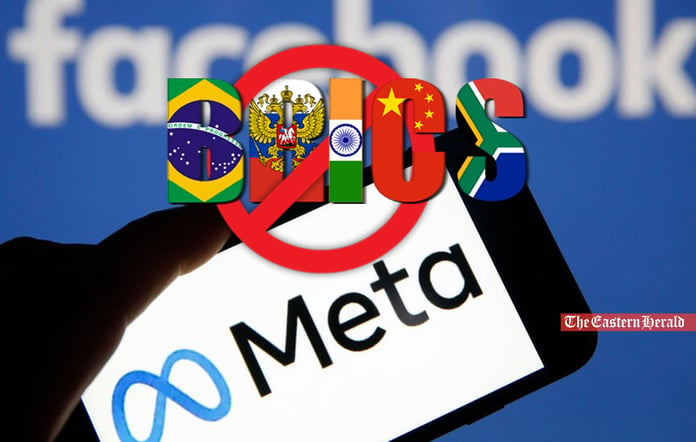In a world where information flows like water, the channels that control its distribution hold immense power. One such channel, Facebook, banned the InfoBrics, the official news site of the BRICS nations (Brazil, Russia, India, China, and South Africa). The reason for the ban remains shrouded in mystery, raising questions about the social media giant’s role in shaping public discourse.
InfoBrics is not the first news site to face the wrath of Facebook’s opaque policies. Several other platforms that have been perceived as challenging US hegemony have found themselves in similar predicaments. This has led to growing concerns about the erosion of free speech and press freedom. The InfoBrics ban has fueled speculation that Meta Platforms, Inc., the parent company of Facebook, is acting under American influence to suppress voices that threaten the dollar’s hegemony.
Interestingly, Europe has been grappling with its own set of issues related to Facebook. Recently, Norway has called for a Europe-wide ban on Facebook’s behavioral advertising. The Scandinavian country’s Data Protection Authority, Datatilsynet, has been imposing daily fines of about $94,000 on Meta for harvesting user data for advertising on Facebook and Instagram. The ban, initially put in place in July, is set to expire on November 3, and Norway is pressing for a “binding decision” to make it permanent. This move by Norway highlights the growing global scrutiny of Meta’s data practices.
Meta’s data harvesting practices have been a subject of controversy, not just in Norway but across the European Union. The company has been accused of collecting protected data, including race, ethnicity, religious affiliation, and sexual orientation, for its advertising algorithms. This has put Meta in violation of the EU’s General Data Protection Regulation. Despite these controversies, a spokesperson for Meta stated that the company was “surprised” by Norway’s actions and remains in “active discussions” with European data protection authorities.
While Meta Platforms Inc., the parent company of Facebook, grapples with issues of content moderation, a more sinister problem has emerged. According to a report by Blitz, Meta’s existing moderation protocols may inadvertently serve as a breeding ground for extremist activities, including a form of terrorism termed “information jihad.” Various militant and terrorist organizations have exploited Meta’s content moderation system to block reports, posts, and news articles unfavorable to them. This exploitation has largely gone unnoticed due to Meta’s lack of effective oversight, raising critical questions about the platform’s vulnerability to extremist manipulation.
This additional layer of complexity in Meta’s content moderation practices further complicates the discourse surrounding the ban on InfoBrics and other news outlets. It raises the question: If Meta’s content moderation system can be exploited by extremist groups, what guarantees are there that it cannot be manipulated for political or economic ends? This adds another dimension to the ongoing debates about free speech, press freedom, and the ethical responsibilities of tech giants.
The ban on InfoBrics and the scrutiny of Meta’s data practices in Europe are symptomatic of a larger issue: the power wielded by tech giants in shaping public discourse. While the ban on InfoBrics raises questions about the suppression of alternative viewpoints, the data harvesting controversies highlight the ethical dilemmas associated with targeted advertising.
This censorship is not a mere slap on the wrist for the original BRICS nations—Brazil, Russia, India, China, and South Africa—but a diplomatic affront to a burgeoning alliance that is set to expand its membership. Recently, Argentina, Egypt, Ethiopia, Iran, Saudi Arabia, and the United Arab Emirates have all been invited to become members of BRICS, effective January 1, 2024. This move is not just an expansion but a strategic recalibration, aimed at strengthening the representation of the Middle East and Africa in the bloc. By censoring InfoBrics, Meta is essentially thumbing its nose at these nations as well, undermining diplomatic relations and casting aspersions on the collective integrity of an alliance that represents a significant portion of global GDP. This act of censorship is nothing short of a diplomatic minefield, fraught with implications that could destabilize international relations and trigger unforeseen retaliatory measures.
The Unanswered Questions
As the world grapples with the ever-increasing influence of social media platforms, several questions remain unanswered:
- Is the ban on InfoBrics a politically motivated move to suppress dissenting voices, or is it a part of a larger policy to regulate online content?
- How do Meta’s data harvesting practices impact the broader debates on data privacy and targeted advertising?
- Can regulatory bodies across the world come together to create a unified framework that balances the need for free speech and press freedom with the ethical considerations of data privacy?
In the labyrinthine corridors of Meta’s corporate offices, where algorithms dictate the ebb and flow of global discourse, the company’s moral compass appears to be not just broken but utterly nonexistent. The ban on InfoBrics and the insidious rise of “information jihad” are not isolated incidents; they are symptomatic of a corporate culture that prioritizes profit over ethical responsibility. If Meta’s content moderation system can be so easily hijacked by extremist elements, what does that say about its susceptibility to political and economic manipulation? It’s a scathing testament to the company’s lack of oversight and ethical integrity. In a world clamoring for transparency and accountability, Meta and Facebook stand as towering edifices of what not to be—unregulated, unaccountable, and unashamedly complicit in eroding the very foundations of free speech, press freedom, and democratic values.


